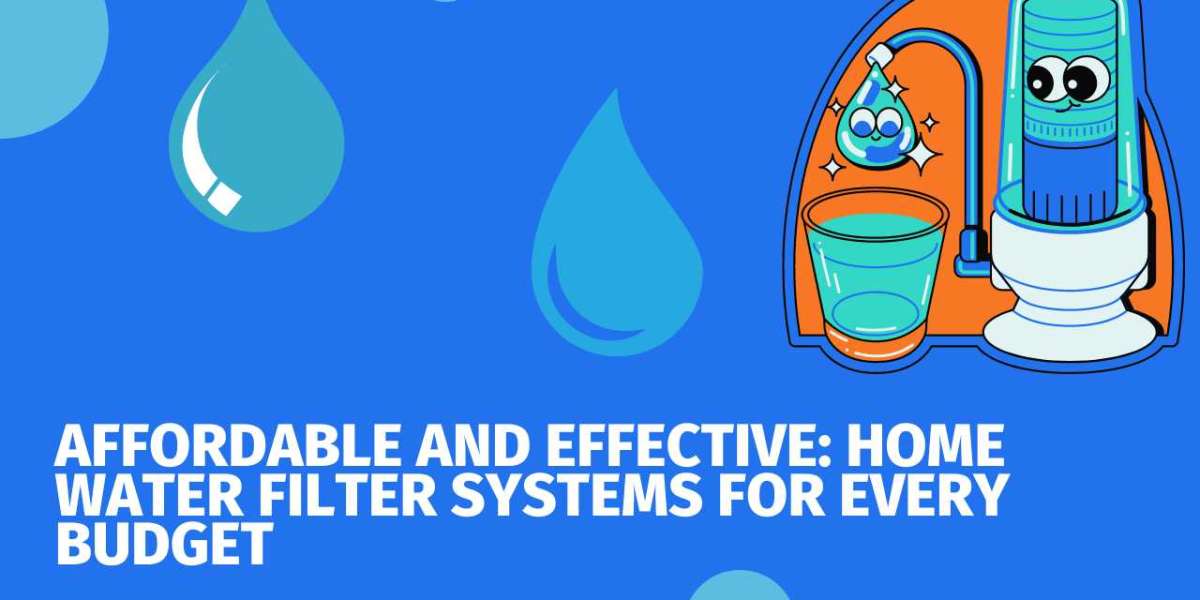Water is a basic necessity of life, and having access to clean and safe drinking water is essential for good health. Unfortunately, many people around the world do not have access to clean drinking water, and even those who do have access may not be getting the water that is as clean as they think. In fact, many municipal water systems have been found to contain contaminants such as lead, pesticides, and even pharmaceuticals.
One solution to this problem is to install a home water filter system. A water filter system can remove contaminants from your tap water and provide you with clean and safe drinking water. In this article, we will discuss affordable and effective home water filter systems for every budget.
Why use a home water filter system?
As mentioned above, many municipal water systems have been found to contain contaminants such as lead, pesticides, and even pharmaceuticals. Even if your municipal water system is not contaminated, there may be other contaminants present in your water supply that you are not aware of.
A home water filter system can remove contaminants from your tap water and provide you with clean and safe drinking water. This is especially important for people who have compromised immune systems or who are susceptible to waterborne illnesses.
Additionally, a home water filter system can improve the taste and odor of your water. This is especially important for people who live in areas with hard water or who do not like the taste of their tap water.
Types of home water filter systems
There are several types of home water filter systems available, each with its own advantages and disadvantages. Here are some of the most common types of home water filter systems:
- Carbon filters
Carbon filters are the most common type of home water filter system. They work by absorbing contaminants into the carbon, which is then removed from the water. Carbon filters can remove chlorine, sediment, and some volatile organic compounds (VOCs).
Carbon filters come in several different forms, including activated carbon, granular activated carbon, and carbon block filters. Activated carbon filters are the most common and are generally the least expensive. Granular activated carbon filters are more effective than activated carbon filters but are also more expensive. Carbon block filters are the most effective but are also the most expensive.
- Reverse osmosis
Reverse osmosis (RO) is a type of water filtration system that uses a semipermeable membrane to remove contaminants from water. RO systems can remove minerals, salts, and some organic compounds from water.
RO systems are generally more expensive than carbon filters and require more maintenance. However, they are also more effective at removing contaminants from water.
- UV filters
UV filters use ultraviolet light to kill bacteria and other microorganisms in water. UV filters are often used in conjunction with carbon or RO filters to provide additional protection against waterborne illnesses.
UV filters are generally less effective than carbon or RO filters at removing contaminants from water. However, they are effective at killing bacteria and other microorganisms in water.
- Distillation
Distillation is a process that involves boiling water and then condensing the steam back into water. Distillation systems can remove minerals, salts, and some organic compounds from water.
Distillation systems are generally more expensive than carbon filters and require more maintenance. However, they are also more effective at removing contaminants from water.
Factors to consider when choosing a home water filter system
When choosing a home water filter system, there are several factors to consider. Here are some of the most important factors to consider:
- Contaminants in your water supply
The first thing to consider when choosing a home water filter system is the contaminants in your water supply. Different types of filters are designed to remove different types of contaminants. For example, if your water supply contains high levels of lead,
you may want to choose a filter system that is specifically designed to remove lead. It's important to have your water tested to determine the contaminants present in your water supply before selecting a filter system.
- Budget
Another factor to consider is your budget. Home water filter systems range in price from less than $20 for a basic carbon filter to several hundred dollars for a high-end reverse osmosis system. It's important to determine your budget and choose a filter system that meets your needs and fits within your budget.
- Maintenance
Different types of filter systems require different levels of maintenance. Carbon filters need to be replaced periodically, while RO systems require more frequent maintenance. It's important to choose a filter system that you can maintain properly and affordably.
- Installation
Some filter systems are easier to install than others. Carbon filters can be installed directly onto your faucet, while RO systems require professional installation. It's important to consider the installation process when choosing a filter system.
Affordable and effective home water filter systems
Now that we've discussed the different types of home water filter systems and the factors to consider when choosing a system, let's take a look at some affordable and effective options for every budget.
- Basic carbon filter
A basic carbon filter is the most affordable and simplest option for home water filtration. These filters are available in pitcher, faucet, and countertop models and range in price from less than $20 to around $100. Carbon filters are effective at removing chlorine, sediment, and some VOCs.
One popular option is the Brita pitcher filter, which is available for around $20 and can filter up to 40 gallons of water. Another option is the PUR faucet filter, which is available for around $30 and can filter up to 100 gallons of water.
- Countertop carbon filter
A countertop carbon filter is a step up from a basic carbon filter and provides more effective filtration. These filters attach to your faucet and are available for around $100 to $200. Countertop carbon filters are effective at removing chlorine, sediment, and some VOCs.
One popular option is the AquaTru countertop water filter, which is available for around $200 and can remove up to 99% of contaminants from your water supply.
- Under-sink reverse osmosis system
An under-sink reverse osmosis system provides more thorough filtration than carbon filters and is effective at removing minerals, salts, and some organic compounds from your water supply. These systems require professional installation and can range in price from $200 to $500.
One popular option is the APEC Water Systems reverse osmosis system, which is available for around $200 and includes a five-stage filtration process to remove contaminants from your water supply.
- Whole-house filter system
If you want to filter all the water in your home, a whole-house filter system is a way to go. These systems are installed at the main water supply line and can remove contaminants from all the water in your home. Whole-house filter systems can range in price from $500 to $1,000 or more.
One popular option is the Aquasana whole-house filter system, which is available for around $600 and can remove up to 97% of chlorine and other contaminants from your water supply.
Conclusion
Having access to clean and safe drinking water is essential for good health, and a home water filter system can provide you with the peace of mind that comes with knowing your water is free from contaminants. When choosing a home water filter system, consider the contaminants in your water supply, your budget, maintenance requirements, and the installation process.
From basic carbon filters to whole-house filter systems, there are affordable and effective options available for every budget. Choose the system that meets your needs and enjoy clean and








